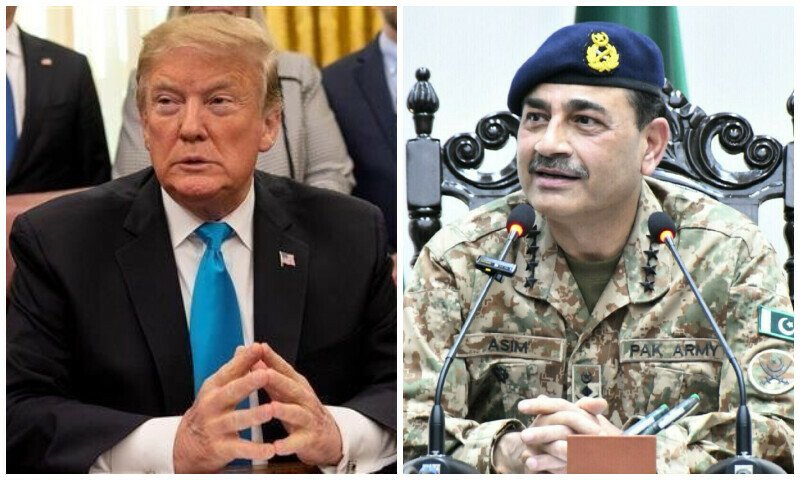Former foreign minister Bilawal Bhutto-Zardari has hailed a meeting due today between United States President Donald Trump and Field Marshal Syed Asim Munir as a “positive step” in bilateral relations between the US and Pakistan.
In a significant and unanticipated diplomatic development, Trump is scheduled to host the army chief for lunch at the White House. The meeting, listed on the president’s official schedule, will be held in the Cabinet Room and closed to the press.
The lunch is being seen in Islamabad as a major diplomatic win, particularly because earlier this month, an Indian delegation met US Vice President JD Vance and Indian media depicted it as a diplomatic success, contrasting it with the apparent inability of the Pakistani delegation to secure a similar meeting. Gen Munir’s invitation to the White House is now being projected by officials in Islamabad as a diplomatic counterpoint to those narratives.
Website Roll Call, describing itself as the “source for news on Capitol Hill”, said the lunch was due for 1pm (10pm PKT).
Addressing the development, the PPP chairman said: “Today, Pakistan’s Chief of Army Staff Field Marshal Asim Munir will meet with Donald Trump over lunch, a positive step in Pakistan-US relations. Especially given the president’s role in mediating a ceasefire.
“Following Pakistan’s decisive victory in the recent five-day war, India has regrettably resisted all efforts toward a permanent peace, including US-led diplomacy.”
He said Pakistan neither sought conflict nor was it “desperate for dialogue”. However, Bilawal said Pakistan recognised that peace was in the interest of both nations.
“There is no military solution to our disputes. India’s weaponisation of water, repression in Kashmir, and politicisation of terrorism are unsustainable positions. The path forward lies in honest diplomacy — not denial.”
Meanwhile, Michael Kugelman, a Washington-based South Asia analyst, emphasised that the meeting should not be seen only in the context of the Iran-Israel conflict.
“There’s been US-Pak engagement on critical minerals, crypto, counterterrorism. Trump takes a deep personal interest in all of these. And Munir is empowered to talk about it all. Also, Kashmir.”
This development also marks a notable success for Pakistan in the ongoing diplomatic contest that followed last month’s air combat with India — a confrontation that brought South Asia dangerously close to nuclear conflict. Munir is in the US on a five-day official visit.
Field Marshal Munir, who was elevated to Pakistan’s rare five-star rank last month — the first such promotion since Ayub Khan in 1959 — has made headlines during his trip, urging India to engage with Pakistan “as a civilized nation,” rather than attempting to impose regional hegemony.
Speaking to members of the Pakistani American community on Monday evening, he strongly rejected Indian claims that Pakistan was behind the terrorist attack in Pahalgam, calling it a pretext for cross-border aggression. He accused India of seeking to establish a dangerous “new normal” of violating international borders, which Pakistan had forcefully rejected. “We would rather embrace martyrdom than accept this dishonour,” he said.
The interaction at the Four Seasons Hotel in Washington’s Georgetown neighbourhood drew a large and enthusiastic crowd, with supporters showering the army chief with rose petals and chanting slogans in his praise. Protesters aligned with the opposition PTI party demonstrated outside, calling for democratic reforms and the release of jailed leaders, but their voices were largely drowned out inside the venue.
In his remarks, Munir also addressed the broader regional landscape, declaring Pakistan’s “clear and strong” support for Iran in its war with Israel while also backing US efforts to de-escalate the situation. “We want this war to end immediately,” he said.
One of the most consequential developments during Munir’s visit, however, has been Pakistan’s strengthened counterterrorism partnership with the US — particularly against the militant Islamic State Khorasan (IS-K) group. On Tuesday, Gen Michael Kurilla, head of US Central Command, described Pakistan as a “phenomenal partner” in the fight against IS-K, praising Islamabad’s operations along the Pakistan-Afghanistan border.
Gen Kurilla revealed to the House Armed Services Committee that Pakistani operations, supported by US intelligence, had killed dozens of IS-K militants and captured multiple high-value individuals, including Mohammad Sharifullah, one of the masterminds of the Abbey Gate bombing in Kabul that killed 13 American troops.
“The first person Munir called was me,” Gen Kurilla said. “He said, ‘I’ve caught him — ready to extradite him back to the US. Please tell the secretary of defence and the president’.” Sharifullah was promptly extradited.
In a separate statement to the Senate Armed Services Committee, Kurilla noted that Pakistan had conducted “dozens of operations” to dismantle IS-K’s presence in the border regions and continues to play a pivotal role in countering terrorism in Central and South Asia.
The Centcom chief’s comments reflect a growing acknowledgement in Washington that Pakistan remains essential to regional stability. As Kurilla noted, while the Taliban have pushed IS-K militants into the tribal areas, these sanctuaries still allow the group to plan and plot attacks not just against regional allies, but also the US homeland.
Despite the security challenges Pakistan faces — including over 1,000 terrorist attacks last year alone, which claimed the lives of some 700 security personnel and 2,500 civilians — Gen Kurilla said Pakistan “has been a phenomenal partner in the counterterrorism world”.
During his interaction with the diaspora community, Gen Munir emphasised Pakistan’s gratitude for the role overseas Pakistanis play in bolstering the national economy. He dismissed concerns over brain drain, describing it instead as a “brain gain.”
He avoided discussing domestic politics directly, and when one attendee attempted to criticise former prime minister Imran Khan, Munir discouraged it. When another guest jokingly suggested that political opponents might need their “software fixed,” the general responded that democratic societies must protect the right to dissent.
The evening concluded with pledges of renewed commitment from both the army chief and the diaspora to work toward a stronger, more resilient Pakistan.




